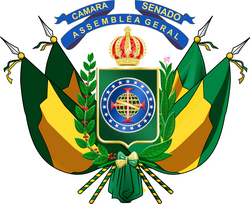General Assembly of the Empire of Brazil Assembleia Geral do Império do Brasil | |
|---|---|
 | |
| Type | |
| Type | |
| Houses | Senate Chamber of Deputies |
| History | |
| Founded | 6 May 1826 |
| Succeeded by | National Congress |
| Leadership | |
President of the Senate | Marquess of Santo Amaro (first) Paulino de Sousa (last) |
President of the Chamber of Deputies | Pereira da Nóbrega (first) Baron of Lucena (last) |
| Seats | 125 deputies and 50 senators [1] |
| Elections | |
Last Senate election | 1889 (The Constitution determined that the Prince Imperial of Brazil would have a seat in the senate when he turned 25 [2] and the election to the senate took place on a triple list from which of the 3 most voted the emperor made one official). |
Last Chamber election | 1889 |
| Meeting place | |
 | |
| Painting by Robert Walsh showing the Chamber of Deputies in 1830. | |
| Constitution | |
| Brazilian Constitution of 1824 | |
The General Assembly was the bicameral parliament of the Empire of Brazil. Article 14 of the Imperial Constitution established the General Assembly, which consisted of the Chamber of Deputies (lower house) and the Senate (upper house). [3] [4]
Contents
Once the General Legislative Assembly had been convened, the first preparatory session of the Chamber of Deputies took place on April 29, 1826, and the opening session of the first legislature (joint meeting of the Chamber of Deputies and the Chamber of Senators) took place on May 6 of the same year. [4]



